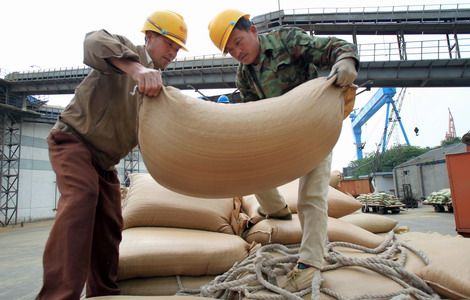Soybean imports set to maintain increase
Updated: 2011-08-11 09:56
By Zhou Siyu and Lan Lan (China Daily)
|
|||||||||||
Workers unload imported soybeans at a port in China. The country imported 5.35 million tons of soybeans in July. [Photo / China Daily]
Higher prices, wider profit margins will result in more purchases: Experts

BEIJING - China will maintain an upward trend in soybean imports with the rise being driven by the widening profit margins of soybean oil crushers and the recovery of the hog production industry.
In July, the country's soybean imports hit 5.35 million tons, an eight-month high and a rise of 24.4 percent from the previous month, according to data released by the General Administration of Customs on Wednesday.
Total imports in the first seven months of 2011 declined by 5.5 percent to 29 million tons year-on-year. "Soybean oil producers will purchase more imported beans because they have been able to raise prices and increase their profit margins," said Zhang Xingchao, an analyst at Jingyi Futures Co.
The government has recently relaxed pricing regulations, which were imposed on a number of key producers of edible oil in November. They were ordered to keep prices unchanged to ease inflationary pressure.
At the same time, the rising shipments showed the recovery of hog production has bolstered demand for soybean meal, a residue of soybean-oil production and a major source of animal feed, Zhang said.
After two years of low production, hog farmers have become more enthusiastic about raising pigs because of the rising price of pork and government efforts to boost the supply of live pigs.
Pork prices increased by 56.7 percent in July from the previous month, a factor that was a major contributor to China's highest inflation in three years. The consumer price index jumped to 6.5 percent in July, driven mainly by soaring food prices, according to the National Bureau of Statistics.
The Ministry of Commerce said it will invest 2.5 billion yuan ($390 million) in large-scale pig farms in 2011 to boost livestock numbers and will pay subsidies to farmers.
"Driven by growing demand, a change in dietary structures and several other factors, China's imports of soybeans will maintain an upward trend for the next 10 to 15 years," said Cheng Guoqiang, a senior fellow at the Development Research Center of the State Council in an exclusive interview.
China is the world's largest soybean importer, but has a self-sufficiency rate of 22 percent. In 2010, soybean imports hit an historic high of 54.8 million tons, compared with 15.2 million tons of domestic production, the General Administration of Customs data showed.
Nevertheless, the area devoted to the growing of soybeans is shrinking. The soybean acreage for the 2011 autumn harvest has declined by 930,000 hectares from last year to 7.6 million hectares, according to a report by the National Development and Reform Commission, China's top economic planner.
Ma Wenfeng, a senior analyst at Beijing Orient Agribusiness Consultant Ltd, a major agricultural consulting company, said greater imports of soybeans will make China more susceptible to price fluctuations in the international food market. "If soybean imports continue to grow and unfavorable weather occurs, China may suffer from international speculation and the ensuing food-price fluctuations in the global market," Ma said.
"An increase in soybean imports over the long term is inevitable," Cheng said.
Related Stories
China will increase US soybean imports 2011-06-23 10:06
Soybean self-sufficiency could be raised, says expert 2011-03-16 13:56
Import price of soybeans rises 2011-02-15 11:02
Farmers aim to increase grain areas 2011-03-18 09:18
- Disney Shanghai discloses operation mode
- China's July fiscal revenues rise 26.7%
- Tests find oil used by KFC not harmful
- China July cotton imports up 30.89% from June
- China set for massive rise in hotel numbers
- Hong Kong stocks fall 2.35%
- Media Markt plans larger network
- Shenhua Group in $8b Xinjiang coal projects













